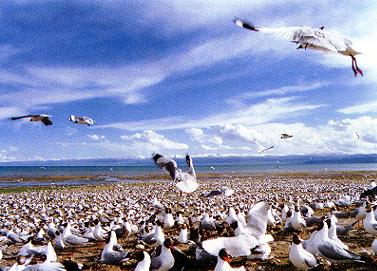Qinghai Lake
 Lying on the Qinghai-Tibet Plateau, known as the Ridge of World , the Qinghai Lake is embraced by the Datong Mountain, Riyue Mountain and Qinghai South Mountain in the northeast of Qinghai Province. As the largest inland saltwater lake in China, the oval-shaped lake covers an area of 4,635 square kilometers and is 3,196 meters above sea level. The weather here is cool all the year round. Even in midsummer, the daily average temperature is about 15 C, making the lake a perfect summer resort.
Lying on the Qinghai-Tibet Plateau, known as the Ridge of World , the Qinghai Lake is embraced by the Datong Mountain, Riyue Mountain and Qinghai South Mountain in the northeast of Qinghai Province. As the largest inland saltwater lake in China, the oval-shaped lake covers an area of 4,635 square kilometers and is 3,196 meters above sea level. The weather here is cool all the year round. Even in midsummer, the daily average temperature is about 15 C, making the lake a perfect summer resort.
In the Qinghai Lake are five islands of different shapes, namely the Haixin Hill (hill in the middle of the sea), Gucha Hill (Three-stones Hill), Bird Island, Haixi Hill (hill in the west of sea) and Sand Island, of which the Bird Island is the most famous one. Reputed as the Kingdom of Birds, the island is 10 meters above the lake water, covering an area of 0.11 square kilometers. In late spring and early summer every year, thousands of birds come to their kingdom and their chirm can be heard several miles away, forming a spectacular scene. Various kinds of birds roost here, including gull, wild goose, swan, crane, and the rare black neck crane.
The lake is also abundant in fish, among which the naked carp is the most famous and delicious. Also known as Huang fish without scale, it has a reputation of the king of lake in the local area.
Source: http://www.chinaculture.org